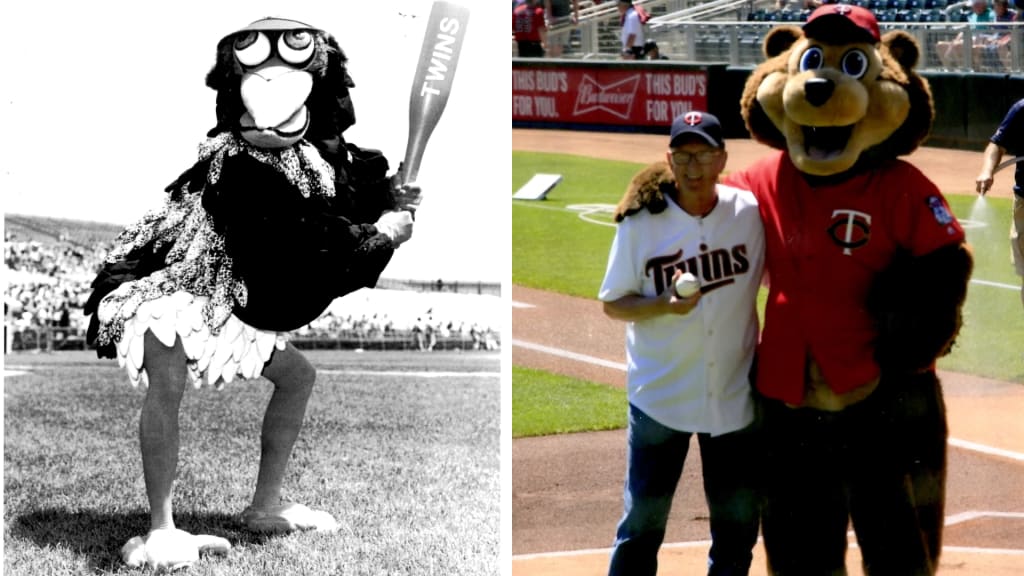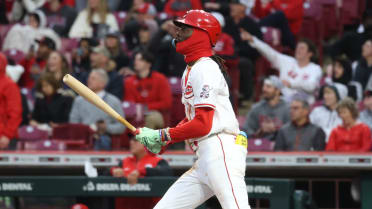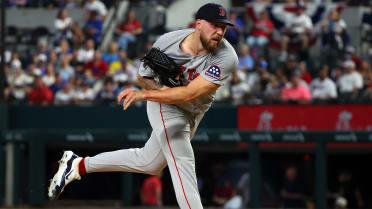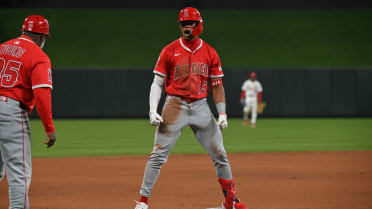
MINNEAPOLIS -- T.C. Bear doesn't talk while in character -- but he made an exception for Alan Johnson.
At the invitation of team historian and curator Clyde Doepner, Johnson took his wife and two grown children to Target Field for a sunny day game in 2019, and clad in a white Twins home jersey and jeans, he threw a successful first pitch to the Twins' mascot. He and the bear got together for a photo, and as they walked off the mound, T.C. drew Johnson closer.
"You don't know this, but back in 1980, '81, I was 7 years old at the Old Met watching a game, and I saw you, and you gave me one of your picture cards and signed it for me," the mascot told him quietly. "I still have that."
That's the kind of lasting impression T.C. Bear himself makes on kids around Twins Territory every day. As it turned out, Johnson gave the young T.C. that experience during the mascot's own childhood, too.
If you scroll through Johnson's page on IMDb, you'll find a long list of credits, spanning titles from "Spider-Man: The Animated Series" to an episode of "ER" to several '90s TV movies and series in addition to award-winning work in the Los Angeles theater community. (He also lists, among his skills, impressions of Kermit the Frog, Elmer Fudd and Ronald Reagan.)
What you won't find listed is one of his most memorable work experiences: His two-year gig as Twinkie the Loon, the first mascot of the Minnesota Twins.
"It's one of the highlights of what I've been able to do as an entertainer," Johnson said. "It's a unique part of history, not only for the Twins, but for me. It's my hometown. It's a real important part of my history. And, you know, a lot of people remember it fondly. And it's always going to be a big part of my journey as an entertainer and my journey in life."
T.C. Bear is essentially a large, squishy, oversized stuffed animal of sorts, shooting T-shirt guns and spending much of his time roaming around the stands among the fans for interaction and photo ops as part of the in-game experience. Twinkie the Loon had a very different flair for entertainment, rooted in Johnson's many talents as a showman.
First, let's run through what Twinkie looked like. There were massive golden shoes, and Johnson would also slide his legs into golden tights to emulate the legs and feet of a loon. There was a black-and-white feathered body that zipped up in the back, with golden gloves to cover Johnson's hands. The black-feathered head was built around a football helmet with huge eyes and an overly long beak attached, and the ensemble was sometimes topped by a massive red Twins cap.
Now, imagine that bird riding a unicycle around the warning track, juggling plastic baseball bats atop the dugout and spitting ping pong balls out of his beak as part of a juggling routine. Johnson hadn't seen a juggling sports mascot before and was determined to make Twinkie's character his own during the mascot's short-lived tenure from 1980-81.
"I wanted to try to give them an experience that will be memorable for them," Johnson said.
After Johnson initially graduated from the University of Minnesota with a degree in theater, he settled into a gig at Camelot, a restaurant off the intersection of interstate 494 and highway 100, as part of a 10-piece ensemble that would do tributes to the Beatles, Rodgers and Hammerstein and such. That's when he learned how to juggle, and he'd take gigs at the Renaissance Fair and at ValleyFair to continue building his brand while looking for opportunities with the local sports teams.
In 1979, he found a good one with the Twins, receiving the opportunity to perform his juggling show at a handful of events.
"Anything [Twins owner Calvin Griffith] could do to entertain, or didn't cost them money -- he didn't give anything away -- he would gladly do that," Doepner said. "And so at bat day and jacket day and fan appreciation day, he was the entertainment, he juggled."
After that season, the Twins decided they wanted to augment the in-game experience to include entertainment beyond baseball for fans, and they worked with Johnson to design a costume and a character that debuted on May 16, 1980, at Metropolitan Stadium. (This time, Griffith and the Twins agreed that Johnson would be paid $100 a day for his services.)
Hot summer days at the Old Met and rowdy fans -- and sometimes players -- made for an interesting work environment, as Johnson found out on his first day.
"I don't think I had a handler with me," Johnson said. "One guy during the Brewers homestand, he grabbed my beak, and he wouldn't let go. It was like having a tug-of-war with a dog. I was just, like, pulling back. So yeah, it was pretty brutal. I thought, 'Yeah, maybe I'll spend a little less time in the stands and a little more time on the field.'"
Occupational hazards existed there, too. One day, Johnson stood in costume at the first-base line in front of the Twins dugout, when utility man Mickey Hatcher decided to play human torpedo.
"I was just standing there kind of doing something, whatever," Johnson remembers. "And the next thing I know, I'm launched in the air. He came out of the dugout running like a middle linebacker and hit me and launched me in the air, maybe 10 feet, and then landed on top of me and then he laughed."
Once Johnson got his wind back, he actually ran after Hatcher and tackled the player in the outfield, and the pair wrestled for a bit on the grass. (Could you imagine the reaction if Hatcher had somehow gotten hurt in the scuffle?)
Johnson was winded and a bit angry at the time, but decades removed from those experiences, they're some of his most cherished memories of enjoying his hometown team play baseball from one of the most unique seats in the house.
All the same, he was ready to move on after the 1981 season, and when the Twins moved away from Metropolitan Stadium to the Metrodome, he opted to walk away to continue developing his juggling and entertainment career on the high seas with the Carnival Cruise Line, traveling around the Caribbean and eventually as far as Bora Bora, Tahiti, Australia, Indonesia and Hong Kong. He figured that another creative chapter awaited him, and that the new Metrodome would prove enough of a draw for fans, even in his absence.
These days, Johnson lives at home in Plymouth, Minn., and remains active in his entertainment career. His primary relics of his time as Twinkie the Loon include a custom Twins jersey that says "TWINKIE" on the back -- a gift from his son, Sam -- and a scrapbook assembled by his daughter that keeps a record of those two unforgettable years.
Once, Sam went to a Twins game wearing the Twinkie jersey and was stopped by a group of older women who fondly remembered Johnson's days as Twinkie at Metropolitan Stadium and asked Sam for a photo. Johnson will always appreciate the fact that, in some small way, he's woven his passion for entertainment into contributions to the fabric of his hometown team -- and he'll occasionally get a reminder like that, making him smile.
"Life is full of chapters," Johnson said. "At the end, you hope you have a full, complete, multicolored book. And this, this is a wonderful chapter of my life that I will always cherish and always remember.
Do-Hyoung Park covers the Twins for MLB.com.




